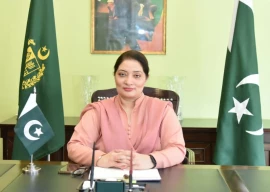
As textile mills refuse to pay the cotton cess and file lawsuits, the government has decided to dissolve the Pakistan Central Cotton Committee (PCCC), an institution founded to conduct cotton research aimed at improving quality.
The Economic Coordination Committee (ECC) recently noted that the PCCC had become inefficient due to a financial crisis. In response, the ECC recommended the organisation's closure.
The ECC directed the Ministry of National Food Security and Research (MoNFS&R) to submit the case to the Cabinet Committee on Rightsizing along with a way forward for continuing cotton research after the PCCC is dissolved. The MoNFS&R will also work with the Finance Division to resolve funding issues and recover receivables from textile mills.
Additionally, the MoNFS&R was tasked with consulting the Attorney General of Pakistan and provincial advocate generals to expedite the resolution of pending court cases involving the cess.
According to the MoNFS&R, since 2016, cotton mills have been reluctant to pay the cotton cess, filing 65 cases in various High Courts and the Supreme Court. This has resulted in significantly reduced earnings, leading to partial salary payments over the past two years. The ECC noted that the sustainability plan submitted by MoNFS&R for PCCC was inadequate and that its viability was questionable.
While cotton research remains crucial for the agricultural economy, structural issues persist. The cess, levied on the private sector, funded research in the public sector, primarily covering employee-related expenses. The ECC suggested that this research should instead be conducted by the private sector.
The ECC agreed that the PCCC should be dissolved and tasked MoNFS&R with proposing a future plan for cotton research to prevent disruptions in this critical area. Additionally, it urged prompt resolution of the pending legal cases surrounding the cotton cess.
The MoNFS&R informed the ECC that the PCCC was allocated a loan of Rs656 million for employee-related expenses (ERE) in the Federal Budget 2024-25. The PCCC, established in 1948 under the Cotton Cess Act of 1923, operates under the MoNFS&R with a mandate to promote cotton research, increase production, and improve marketing through a cotton cess of Rs50 per bale, collected from textile mills.
Since 2016, however, cotton mills have resisted paying the cess, especially after the rate increased from Rs20 to Rs50 per bale, as recommended by the ECC in 2012, and the imposition of the cess on imported cotton. Although the PCCC won 63 of the 65 legal cases, with only two pending in the Peshawar High Court, the lack of cess payments has severely impacted employee salaries and pensions, which have been cut by 50% and 80%, respectively, since June 2022.
To address the financial shortfall, the federal government provided a supplementary grant of Rs.419 million in May 2021. Additionally, the ECC approved a Rs.300 million loan in June 2023 to ensure the payment of salaries and pensions. However, the loan was not disbursed due to the financial year ending on June 30, 2023.
The ECC also directed the food ministry to devise a permanent solution for the committee's financial sustainability. In response, the vice president of PCCC submitted a proposed solution to address the financial crisis, which was included as Annex-VI in the summary. This included a repayment schedule for a Rs656 million loan from the PCCC.
The ministry sought ECC approval for the Rs656 million loan to enable the PCCC to pay salaries and pensions to its employees.
However, the ECC of the Cabinet reviewed the summary submitted by the Ministry of National Food Security and Research regarding the "Loan amounting to Rs656 million to Pakistan Central Cotton Committee (PCCC), Multan," and ultimately rejected the proposal.

1727242355-0/Diddy-(1)1727242355-0-405x300.webp)
1727242355-0/Diddy-(1)1727242355-0-165x106.webp)















COMMENTS
Comments are moderated and generally will be posted if they are on-topic and not abusive.
For more information, please see our Comments FAQ